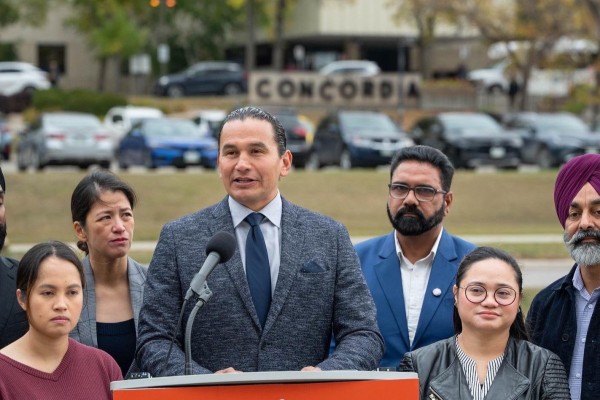What can the new Manitoba NDP government do?
Implementing a bold reform agenda will take vision and determination

Manitoba Premier-designate Wab Kinew. Photo courtesy the Winnipeg Free Press.
There are good reasons to celebrate the NDP’s win in the October 3 provincial election in Manitoba. Especially important is that the Conservative’s appeal to the far-right was decisively turned back by voters, and in fact there is widespread revulsion directed at the basest parts of the Conservative campaign.
The Conservatives, under both Brian Pallister and Heather Stefanson, imposed a regime of severe austerity on Manitoba. Their cuts and their mismanagement have caused serious damage, especially to health care but also in virtually all areas of provincial jurisdiction, as shown in detail in a forthcoming book edited by Jesse Hajer, Ian Hudson and Jennifer Keith. In addition, at the end of the election campaign the Conservatives released a series of attack ads intended to appeal to the racism that has for so long plagued Manitoba. The electorate rejected this approach to politics, both the ugliness at the end of the campaign and the severe austerity since 2016. This is grounds for some optimism given that Pierre Poilievre is likely to be selling a version of the same approach come the next federal election.
Another reason for celebration is that for the first time in Canadian history, a First Nations person is the premier of a Canadian province. That Wab Kinew, a First Nations man, should be elected premier in Manitoba, where on a per capita basis the Indigenous population is Canada’s largest, and where racism has long been deeply entrenched, is remarkable and important. Colonialism continues as part of the air we breathe in Manitoba. This finds expression in the fact, for example, that some 9,000 children in the province are in care, 90 percent of whom are Indigenous. Indigenous people are similarly wildly overrepresented in the province’s prisons, jails and youth detention centres, and among the growing numbers of homeless people who are living in bus shelters, on riverbanks and beneath cardboard boxes in back lanes. Given all of this, electing an Indigenous man as premier is at the very least an important symbolic victory, and will offer hope and, I expect, new opportunities and supports to Manitoba’s large Indigenous population. This is evidenced, I believe, by Kinew’s immediate commitment to searching the landfill for the remains of Indigenous women believed to be there.
I think we can expect that the NDP will govern for at least two terms. We can expect solid, honest governance that produces outcomes considerably better than what the Conservatives have delivered since 2016. Given the rise of the far-fight in Canada and throughout the industrialized world, that is worthwhile. The question, however, is can this NDP government produce meaningful reforms in the many areas where they are so desperately needed?
Here are the main things that this government should do over the next eight years.
First, they have to deliver meaningful improvements in health care. These are needed, and this was the centrepiece of their election promises. But health care is a massive, complex task. The problems were present under previous NDP governments and have been made worse by years of Conservative austerity and mismanagement. It will be important that the health care problem be viewed as a labour issue. We need many more health care professionals and support staff. The health care unions have immediate, tangible solutions, and the best of these should be implemented without delay. Over the longer haul, it will be necessary to make employment in health care an attractive career option, for nurses and doctors, but also for the many other workers who make the system work. For example, the NDP government should move quickly to make work in long-term care homes and in homecare and related fields a career, with full-time employment, good wages and benefits, and union protections, which would have the added and especially important benefit of improving the quality of care. Also, the new government should move immediately to establish safe consumption sites in Winnipeg and perhaps elsewhere in Manitoba, a policy measure that has proved successful elsewhere in saving lives, but to which the Conservatives were unbendingly opposed for narrow ideological reasons. It is also important that particular attention be paid to the health and other needs of people with disabilities, an area in which previous NDP governments have been found wanting. Early, tangible gains in health care, which are possible, will win broad working class support, including in Winnipeg’s suburbs that are so important for election victories.
Second, the NDP government should take the steps needed to make Manitoba’s childcare the best in Canada. Again, this should be viewed in large part as a labour issue. Make employment in childcare a solid, working class career, with good wages and benefits and union protections. It will be particularly important that new childcare centres be located in low-income areas, and that provision be made to train low-income people and especially Indigenous people to take these jobs. Doing so will bring many people into the paid labour force, both childcare workers, including people who would otherwise be on social assistance, and those parents who need affordable childcare if they are to work in the paid labour force.
Third, and following from the above, the NDP government should move low-income people into the paid labour force in large numbers. Strong and detailed recommendations have been made in the area of adult basic education, which could move many hundreds of people into the paid labour force, year after year, at a cost that is miniscule in a provincial budget. Environmental organizations have, among other important climate change recommendations that will need to be addressed, advanced plans for retrofitting buildings, which would have important positive impacts on climate change, and which would require that thousands of people be trained and moved into the paid labour force. The models for doing this have been well developed in Winnipeg’s low-income inner city and need simply to be scaled up. The up-front costs will be recovered through increased tax revenues.
Fourth, we need significant improvements in labour legislation and labour standards. One of the many things made clear by the pandemic is that people doing many of the jobs that are necessary to keep our economy healthy—jobs that go largely unrecognized and are taken for granted—are not being adequately paid. Paul Moist has set out what is needed in this area in his contribution to this issue, and the Canadian Centre for Policy Alternatives-Manitoba is making labour legislation a big focus of their work in this new era.
Fifth, there is a desperate need for good quality, affordable housing for low-income people, in Manitoba as across the country. The new NDP government should immediately stop the shameful Conservative practice of selling off Manitoba Housing units, and should renovate those many Manitoba Housing units, believed to be more than 2,000, that have been allowed to sit vacant in recent years. And steps should be taken to prevent large, for-profit housing corporations from purchasing housing complexes built with government financial contributions. This recently happened with the sale of Lions Place in Winnipeg to an Alberta-based for-profit company. Tenants of modest means, most of them seniors, will pay the price for this corporate takeover. And the government will have to build more housing, and especially social housing. The Right to Housing Coalition is calling for 1,000 units per year for the next ten years. Premier-designate Kinew has promised to eliminate homelessness in two terms, and these are among the steps he will have to take to do so. Again, early successes in housing and homelessness will earn broadly-based working class—that is, majority—support, and will put many hundreds of people to work.
As is the case with most of these reforms, the development of cooperative arrangements with the other levels of government will be an essential ingredient of success, and this should be possible at least while the federal Liberals, supported by the federal NDP, remain in office.
Sixth, all these measures should be seen as a new and improved anti-crime strategy, putting people to work doing things that need to be done, with good wages and benefits and job security and career prospects. Crime, including the increase in seemingly random attacks on people, is a growing problem and is near the top of Manitobans’ list of concerns. Both the Conservatives and previous NDP governments have responded to crime by filling the remand centres and jails and prisons and youth detention centres with those who are poor. That has proved to be a failed approach, and needs to be replaced by a strategy rooted in a recognition of the social determinants of crime, especially the importance of employment and educational opportunities that create a genuine belief among young, marginalized people that a better future is possible.
Seventh, but not seventh in terms of importance, Manitoba has a major poverty problem and this simply must be attended to. Manitoba is the province with the highest rate of child poverty in Canada; Churchill-Keewatinook in northern Manitoba is the federal riding with the second highest rate of child poverty in Canada. Each of the six measures recommended above would put large numbers of people to work and would improve their pay and benefits and employment status, which in itself would significantly reduce the incidence of poverty. For those reduced numbers still living in poverty, Make Poverty History Manitoba has recommended a Livable Basic Needs Benefit, which, when combined with other benefits such as Rent Assist and the federal Canada Child Benefit, would bring all those on social assistance to at least the Market Basket Measure poverty line.
This is a formidable to-do list. It has been decades since NDP governments anywhere in Canada have undertaken such a bold approach to governing, and this particular NDP government faces fiscal constraints. Nevertheless, this is the kind of reform program that the incoming Manitoba NDP government should commit to doing. Implementing such an agenda will take vision and determination, and skillful management and ideological clarity, and it will take courage. However difficult this may be, it is possible. Those of us active in the community will have to be equally skillful and determined in pushing the NDP to make these important reforms, which in their totality would be transformative.
Readers of Canadian Dimension will be well aware of the many structural obstacles in the way of achieving these goals. There are limits to what any government of a small, relatively have-not province can achieve. However, we would be mistaken to conclude that important gains cannot be made. They can. At the risk of sounding overly voluntarist, achieving these goals depends in large part upon whether the new government wants to make these gains, and whether they have the skills and determination and the ideological clarity to do so. We will see. Those of us active in the community will have to be equally skilled and determined in pushing the NDP to make these important reforms, which in their totality would be transformative.
Jim Silver is Professor Emeritus at the University of Winnipeg and a Research Associate with the Canadian Centre for Policy Alternatives - Manitoba office.










